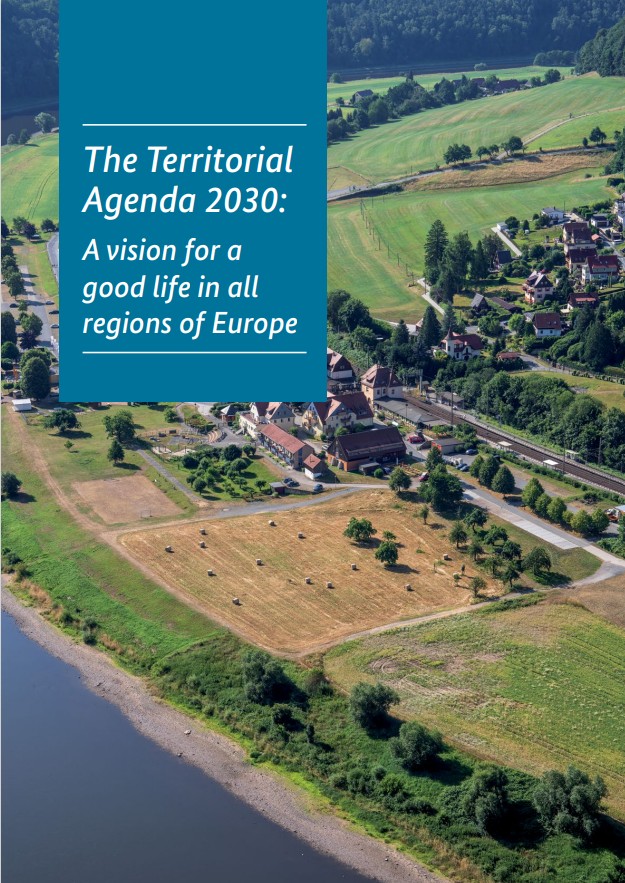Rural regions are proactive regions: learnings from a Territorial Agenda Pilot Action

Sina Redlich
Rural regions act as proactive regions that achieve a great deal through expertise, cooperation and commitment, despite limited resources. Due to the small-scale community structures and the increasing complexity of tasks related to services of general interest, smaller communities in particular rapidly reach the limits of their capacities. Rural regions that have developed structural deficits due to their location or socioeconomic and demographic transformation processes are often described as "structurally weak"or "disadvantaged".
In some cases, this implicitly suggests a limited scope for action and passive acceptance of a downward spiral. However, this narrative is refuted by many local processes and initiatives and is therefore shown to be inaccurate and outdated. Rural regions in the pilot action and beyond act as proactive regions that, despite limited resources, are able to shape their future.
The Territorial Agenda 2030 was adopted on 1 December 2020 under the German EU Council Presidency as a central guiding document for European spatial development. In order to implement its goals and to establish a practical reference, thematic pilot actions were launched. Under the lead of the German Federal Ministry for Housing, Urban Development and Building (BMWSB) and the German Federal Institute for Research on Building, Urban Affairs and Spatial Development (BBSR), the pilot action "A future for lagging regions" considered approaches to securing services of general interest in rural regions. The partner regions worked on the fields of digitalisation, mobility, health and local amenities, among others.
The results of the pilot action include a variety of approaches, examples and measures that illustrate the contributions made to the quality of life by proactive rural regions. The pilot action demonstrates the positive leverage effects that the adaptation of local structures and processes can deliver. For structurally weak regions, two success factors emerge as particularly promising: long-term inter-municipal cooperation and the bundling of competences. They help to make optimal use of limited resources. Structural inter-municipal cooperation enables municipalities to use capacities more efficiently and develop cross-local solutions, thus forming an important pillar for securing services of general interest. With the help of a cross-municipal approach, many public tasks and services can be fulfilled more effectively for citizens. Active interdepartmental and interagency coordination in the administrations can greatly facilitate the work of local initiatives, from which new services of general interest can evolve.
Low-threshold measures can also have a great leverage effect: networking and participation formats form the basis for developing strategic concepts and guiding principles at the local level and for actively bringing the public sector and partners from both the private sector and the local population into dialogue with each other. In order to support cooperative processes more effectively, it is necessary to improve financial incentives and administrative, strategic and planning framework conditions at the national and regional level. Funding programmes should focus on process innovation in rural regions and support cooperation efforts within and among municipalities so that they can continue to function effectively.
Rural regions in the pilot action and beyond act as proactive regions that, despite limited resources, are able to shape their future.
Joining Forces for Rural Development
The results of the pilot action provide motivation for cooperative regional development. They show the positive leverage effects that cooperative regional development can have locally.
Regio Im Walgau, Austria: Inter-communal cooperation supported by regional funding mechanisms
Many public services can be fulfilled more effectively with the help of a cross-municipal approach. Regio Im Walgau has been applying this successfully since 2011 with 14 municipalities. The administration is carried out by an association founded specifically for this purpose. In 2021, the 14 municipalities developed a joint cooperation plan that allows for different formats, legal forms and constellations depending on the issue. The fields of cooperation range from public relations work and securing municipal infrastructure to culture and childcare. The basis for the formulated goals is a regional development concept for Walgau. The cooperation formats are financially supported by the federal state of Vorarlberg.
to support cooperative processes more effectively, it is necessary to improve financial incentives and administrative, strategic and planning framework conditions at the national and regional level.
District of Görlit z, Germany: Competence centre for local initiatives and inter-municipal cooperation
In the district of Görlitz, challenges related to the provision of services of general interest such as mobility, utility supply, accessibility and rural logistics have for many years been addressed within the framework of a structured dialogue with relevant community stakeholders. To better address the specific needs of municipalities and to further support local cooperation processes and structures of local engagement, a new competence centre was established within the district administration that encompasses an overarching division. It operates across all departments and bundles different responsibilities and powers. It is intended to serve as a central point of contact for municipalities and stakeholders from the region to help implement projects and ideas from citizens and municipalities by providing the necessary expertise and thus improve services of general interest. The competence centre is an expression of the district's new self-conception as a coordinator and facilitator of district development.
Sina Redlich, Federal Institute for Research on Building, Urban Affairs and Spatial Development (BBSR) -European Spatial and
Urban Development

//image from the
final report